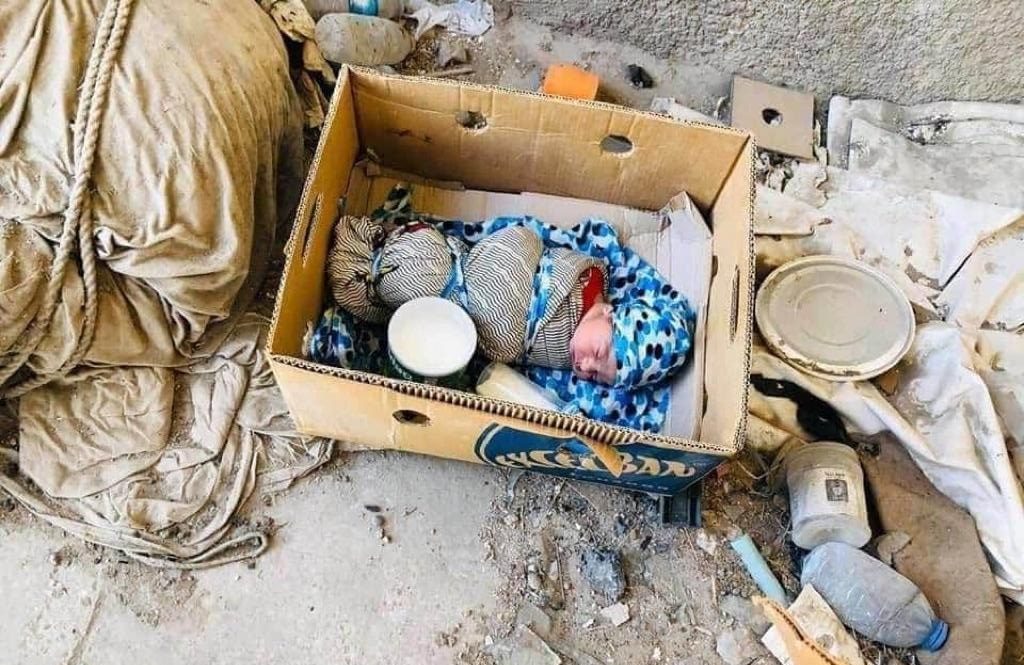ERBIL, KRG IRAQ (North Press) – Mayson al-Sa’adi, head of the Parliamentary Committee on Women, Family, and Childhood in Iraq, said on Wednesday that the draft law on the protection of children issued by the Ministry of Labor and Social Affairs reached the State Council and then to the Council of Ministers, and it was voted on.
For years, separate Iraqi regions, including the Kurdistan Region (KRG), have witnessed incidents of abandonment of newborns each year along roadsides and in trash cans.
Al-Sa’adi said in an interview with North Press, “The draft law has been delivered to the parliament. It is now on the table of the Presidency of the Parliament, and it is expected to be sent to our relevant committee.”
The head of the committee revealed that the draft law consists of 14 paragraphs related to the protection of children.
Although the committee has not seen the texts of the draft so far, there is a special article to change the term “foundling child” and use a legal term that preserves the rights of the child, according to al-Sa’adi.
Over the past few years, there have been many stories of infants who ended up on the street, in front of homes, at a mosque, or left in a hospital to face an unknown fate.
Last year, a girl was officially admitted to the Kirkuk hospital as a patient, and the mother stayed with the child for two days, only to suddenly disappear and abandon her child in the children’s health care department, according to a source from the hospital.
In November 2020, a newborn baby was found in al-Sina’a neighborhood in southern Erbil, until he was transferred to a security center and from there to a hospital to receive health care.
In the same month, a 10-day-old girl was found near the central market in Soran District, Erbil, and was taken to the hospital for care.
The police found a baby among garbage in Hawija district, southwest of Kirkuk governorate.
Protecting society
These incidents are just a few of the dozens of cases that occur annually in Iraq.
Abdulhafez al-Jubouri, the director of Community Police media in Iraq, says that his organization organizes and implements a wide campaign that is primarily concerned with strengthening the family bond and combating violence against women and children.
The Community Police, in coordination with the Directorate of Family and Child Protection, and some civil and international organizations active in the field of human and women’s rights, organize conferences, workshops, and forums to discuss issues of underage marriage and girls running away as a result of domestic violence or forced begging.
These actions come, according to what the security official told North Press, “with the aim of protecting society from falling into crime, and to identify the causes to address them and develop effective solutions to the problems.”
Al-Jubouri attributes the cases of child abandonment to poverty, wars, ignorance, excessive freedom and the wrong use of social media.
“Just as social destitution, in addition to the previous and other reasons, all or some of them contributed to the emergence of such cases,” he added.
The official says that the cases of infant abandonment are still limited, and most of them are born out of wedlock.
He notes that infant abandonment did not reach the extent of the phenomenon, and it is few compared to other social cases.
However, the number of cases increased after the Islamic State (ISIS) invaded some governorates in June 2014.
Among the main reasons for infant abandonment are economic conditions and sexual relations out of wedlock.
These reasons contribute to an increase in the number of cases of throwing children in the street, and even human trafficking is linked to this matter, according to social researchers.
The provisions of Article 16 of the Iraqi Nursery School Law No. 12 of 1965 encourage the adoption of abandoned children and their integration into society.
By law, nurseries are allowed to receive found children registered in police departments, hospitals, courts, and charitable institutions, after verifying the identity and full address of the depositor.
Adoption
In contrast to the increase in the cases of abandonment of infants, the requests for adoption increased, but court decisions take a long time, while there are no special government institutions to house these children until the court’s decision.
The Iraqi law used the term of “embracing” instead of “adoption,” as it is a more socially accepted and kinder expression. The adoption process requires many conditions, which begin with submission of an application from a mentally sound Iraqi couple free from infectious diseases.
The law also added that the boy or girl must have a share not exceeding one third of the family’s heirs, who must prove that they can’t have child, and the marriage has passed for a period of no less than five years.
After these procedures, the court issues a decision that lets the parents foster the child for six months for observation, as it sends a social worker to verify the full care of the child. After confirmation, the court issues its decision on permanent adoption of the child by the family.
“Child of honorable ancestors”
In 2014, the Child Welfare Authority of the Ministry of Labor and Social Affairs sought to rename “foundling child” to “child of honorable ancestors,” a more socially accepted term.
Iraqi lawmakers are seeking to prepare a draft law for the Iraqi child to ensure that the name becomes official approved in official state departments, instead of “foundling/”bastard,” which carries flawed connotations, in an attempt to arouse interest and alleviate the feeling of losing their mother and father.

